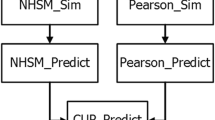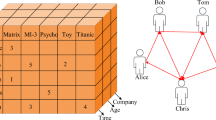Abstract
The purpose of recommendation systems is to recommend users to the items which they are interested in. Recent studies have mentioned the individual models of recommendation systems, and each of such models uses different measures to predict users’ level of interest in items. In order to improve the efficiency of recommendation systems, we have built a hybrid model to combine such different measures. Then, we experimented the proposed model on the ML-20M-GroupLens dataset, and the obtained results have shown that our hybrid model based on weighted ratings improves up to 8.02 % in precision compared to the user-based collaborative filtering model (the individual model that gave the highest precision results on our experiments).
Access this chapter
Tax calculation will be finalised at checkout
Purchases are for personal use only
Similar content being viewed by others
References
Agarwal, A., Chauhan, M.: Similarity measures used in recommender systems: a study. Int. J. Eng. Technol. Sci. Res. IJETSR, ISSN, 2394–3386 (2017)
Aggarwal, C.C., et al.: Recommender systems, vol. 1. Springer (2016)
Ahn, H.J.: A new similarity measure for collaborative filtering to alleviate the new user cold-starting problem. Information Sci. 178(1), 37–51 (2008)
Alhijawi, B., Kilani, Y.: Using genetic algorithms for measuring the similarity values between users in collaborative filtering recommender systems. In: 2016 IEEE/ACIS 15th International Conference on Computer and Information Science (ICIS), pp. 1–6, IEEE (2016)
Cantador, I., Bellogín, A., Vallet, D.: Content-based recommendation in social tagging systems. In: Proceedings of the fourth ACM conference on Recommender systems, pp. 237–240 (2010)
Ghauth, K.I., Abdullah, N.A.: Learning materials recommendation using good learners’ ratings and content-based filtering. Educ. Technol. Res. Dev. 58(6), 711–727 (2010)
Kant, V., Bharadwaj, K.K.: Enhancing recommendation quality of content-based filtering through collaborative predictions and fuzzy similarity measures. Proc. Eng. 38, 939–944 (2012)
Kim, H.N., El-Saddik, A., Jo, G.S.: Collaborative error-reflected models for cold-start recommender systems. Decis. Support Syst. 51(3), 519–531 (2011)
Lehinevych, T., Kokkinis-Ntrenis, N., Siantikos, G., Dogruöz, A.S., Giannakopoulos, T., Konstantopoulos, S.: Discovering similarities for content-based recommendation and browsing in multimedia collections. In: 2014 Tenth International Conference on Signal-Image Technology and Internet-Based Systems, pp. 237–243, IEEE (2014)
Liu, H., Hu, Z., Mian, A., Tian, H., Zhu, X.: A new user similarity model to improve the accuracy of collaborative filtering. Knowledge-Based Syst. 56, 156–166 (2014)
Mahara, T., et al.: A new similarity measure based on mean measure of divergence for collaborative filtering in sparse environment. Proc. Comput. Sci. 89, 450–456 (2016)
Mao, J., Cui, Z., Zhao, P., Li, X.: An improved similarity measure method in collaborative filtering recommendation algorithm. In: 2013 International Conference on Cloud Computing and Big Data, pp. 297–303, IEEE (2013)
McFee, B., Barrington, L., Lanckriet, G.: Learning content similarity for music recommendation. IEEE Trans. Audio Speech Language Process. 20(8), 2207–2218 (2012)
Patra, B.K., Launonen, R., Ollikainen, V., Nandi, S.: A new similarity measure using Bhattacharyya coefficient for collaborative filtering in sparse data. Knowledge-Based Syst. 82, 163–177 (2015)
Peng, T., Wang, W., Gong, X., Tian, Y., Yang, X., Ma, J.: A graph indexing approach for content-based recommendation system. In: 2010 Second International Conference on Multimedia and Information Technology, vol. 1, pp. 93–97, IEEE (2010)
Tintarev, N., Masthoff, J.: Similarity for news recommender systems. In: Proceedings of the AH’06 Workshop on Recommender Systems and Intelligent User Interfaces. Citeseer (2006)
Zenebe, A., Norcio, A.F.: Representation, similarity measures and aggregation methods using fuzzy sets for content-based recommender systems. Fuzzy Sets Syst. 160(1), 76–94 (2009)
Author information
Authors and Affiliations
Corresponding author
Editor information
Editors and Affiliations
Rights and permissions
Copyright information
© 2021 The Author(s), under exclusive license to Springer Nature Singapore Pte Ltd.
About this paper
Cite this paper
Ho, TL., Le, AC., Vu, DH. (2021). A Hybrid Model for Recommendation Systems. In: Pan, JS., Li, J., Ryu, K.H., Meng, Z., Klasnja-Milicevic, A. (eds) Advances in Intelligent Information Hiding and Multimedia Signal Processing. Smart Innovation, Systems and Technologies, vol 212. Springer, Singapore. https://doi.org/10.1007/978-981-33-6757-9_40
Download citation
DOI: https://doi.org/10.1007/978-981-33-6757-9_40
Published:
Publisher Name: Springer, Singapore
Print ISBN: 978-981-33-6756-2
Online ISBN: 978-981-33-6757-9
eBook Packages: Intelligent Technologies and RoboticsIntelligent Technologies and Robotics (R0)




